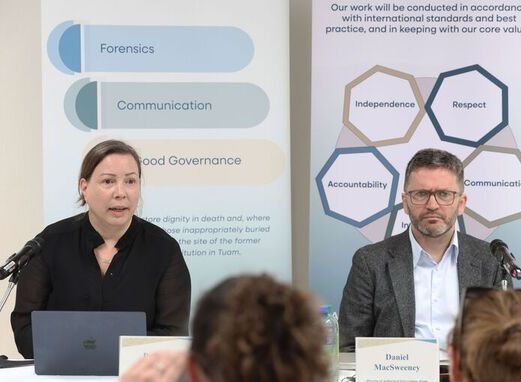Nicole Flattery’s debut volume of stories is “Show Them a Good Time.” PHOTO BY CONOR HORGAN
Page Turner / Edited by Peter McDermott
In introducing Nicole Flattery in June for his Arts Council of Ireland series of interviews novelist Sebastian Barry referred to a younger generation of writers “who are, amazingly, working at this world-class level.” (See video here.)
Barry described her debut “Show Them a Good Time,” published in 2019 by the Stinging Fly in Ireland and Bloomsbury in the UK, as “very extraordinary stories.”
Flattery told us of the volume published in 2020 by Bloomsbury in the U.S., “I wrote the stories between 2015 and 2019. Each story is from the point of view of a female character and I like to think they are funny, but I’ve been assured they are not ‘funny ha-ha.’ A lot of these stories arose, either directly or indirectly, from my own life and I imagine it will be painful to read them two decades from now. I think it was Angela Carter who said, ‘Don’t publish before you’re 30.’ Anyway, it’s too late. At the moment, I’m enormously proud of the book. It’s all felt like a really brilliant dream actually.”
The main character in the title story is a young woman who returns to her home town after a two-year absence in an unnamed city and finds a job in a gas station/garage. Referring to her parents, she says, “Their days had their own sedate, private rhythm, punctuated by the sharp slam of the dishwasher. There was a strange, daily pattern: amble down the street; go to the supermarket; wave at a slight acquaintance; glance at the same patch of sky; come back home. They had seen boredom, stared it straight down, and survived. And still, they were less drained, less aged that I was.”
American poet and essayist Melissa Broder commented, "There’s laughter in the dark and darkness in the laughter in these fabulously astute stories that are at once surreal and more real than reality.”
It’s the almost surrealism, to be sure, of the world of Edward Hopper rather than anything approximately Salvador Dali’s. A children’s author on a national book tour in the story “You’re Going to Forget” speaks of one hotel room’s “flat design, creeping brownness and unfriendly furniture.”
"Affecting and darkly funny,” Time magazine said, “Posing biting questions about identity, sexuality and trauma, ‘Show Them a Good Time’ is an offbeat yet moving look at contemporary womanhood."
The New Yorker reviewer said that "Flattery puts across finely observed everyday details with an absurd sensibility and has a talent for one-liners."
The Financial Times praised the stories’ “seductive insights armored with glittering wit against the pain they describe. Flattery writes with empathy, freedom and virtuosic technique: this debut announces the arrival of a brilliant talent.”
”At its best, which is often,” according to the Guardian, “Flattery’s prose has a thrilling relentlessness and rhythmical snap to it; it pummels and excites."
"Irish women writers are on fire, and Nicole Flattery is yet a further brilliant example,” elle.com said.
“Mind-blowing,” commented the Globe and Mail in Canada, ‘by turns macabre, ferociously funny and concerned with what’s been called, ‘the dark comedy of women’s lives.’”

Nicole Flattery
Date of birth: Sept. 10, 1989
Place of birth: Kinnegad, Co. Westmeath
Published works: “Show Them A Good Time,” a collection of short stories.
What is your writing routine? Are there ideal conditions?
I don’t have a strict writing routine and I’m terrified of writers who do. I hate reading answers from people who are enormously diligent and at the desk 10 hours a day. It’s not realistic—I wrote a lot of the stories in the book around work, and other freelance jobs so I’m pretty good at squeezing writing in. Do whatever suits you. At the same time, I always seem to reach a point with a project where I feel addicted to it, and I can’t pull myself away. That’s the best feeling. I will happily sit at the desk for 10 hours at that stage. As for ideal conditions, peace and quiet and no distractions, like people suggesting a drink or a swim or a walk.I’m pretty sociable so the ideal conditions for me are essentially locked in a quiet basement with no friends around for miles or miles. That’s how all novels should be written.
What advice do you have for aspiring writers?
Very little. Writing advice is dangerous and you should be wary of people who constantly peddle it. I assume I’ve nothing to offer other writers in terms of advice. I didn’t write my own book in any kind of expert, organized way. My only advice would be to try and enjoy it as much as you can. Turn off your phone. Don’t compare yourself to others. Read a lot. Get the bus and look out the window. There’s a section in “Edie,” the Edie Sedgwick biography, where a friend recalls Edie lying on her floor doing her exercises. She tells her friend that her exercises are the only daily discipline she enforces. That’s essentially how I feel about my morning paragraphs. They are my daily discipline. That’s the only habit you should borrow from Edie Sedgwick.
Name three books that are memorable in terms of your reading pleasure.
I feel like the books that I found most pleasurable have nothing to do with the content of the book, but where I was, and how I felt, when I was reading them. I had a very cathartic experience reading Edith Wharton’s “The Age of Innocence.” I cried for the last 20 pages or so. I remember reading Mary Gaitskill’s “Bad Behavior” when I moved to New York when I was 25, and it felt like the start of my actual life, in a way. In terms of genuine pleasure, you simply can’t beat gossip, on the page or in real life. I had such fun in college reading “Easy Riders, Raging Bulls” by Peter Biskind, about the Hollywood New Wave. Similarly, “Parisian Lives” by Deirdre Bair, Beckett’s biographer, is wonderful.
What book are you currently reading?
I’m reading “Valley of the Dolls” and I’m having the time of my life.
Is there a book you wish you had written?
This is an odd question because I feel like it’s often tied up with ideas of success. People rarely say they wish they wrote a book that sold 10 copies. Essentially, it has nothing to do with the actual book but the reception to the book. So, no there’s no book I wish I wrote but if I could think like anyone it would be Jacqueline Rose.
Name a book that you were pleasantly surprised by.
I recently read Janet Malcolm’s “The Journalist and the Murderer” and it is one of the rare books that lives up to the hype. I thought it would be dated, but it’s so deft and smart. Similarly, Penelope Lively’s “Moon Tiger” was much more engaging and sharper than I’d been lead to believe.
If you could meet one author, living or dead, who would it be?
Tove Ditlevsen. I recently read “The Copenhagen Trilogy,” her account of growing up with writerly aspirations in her normal, working-class family home in Copenhagen. They are sensitive, thoughtful books but she has a mischievous sense of humor. Who else could I say? Rachel Cusk? I bet she would rip me to shreds in some lightly fictionalized portrait. I would enjoy that.
What book changed your life?
I think I might have passed the point where a book can change my life. I think it’s most likely to happen when you’re a teenager. That being said, I think Donald Antrim’s “The Afterlife” helped me to understand my own life, and human behavior, better. In totally practical terms, the book that most changed my life was the one I wrote.









